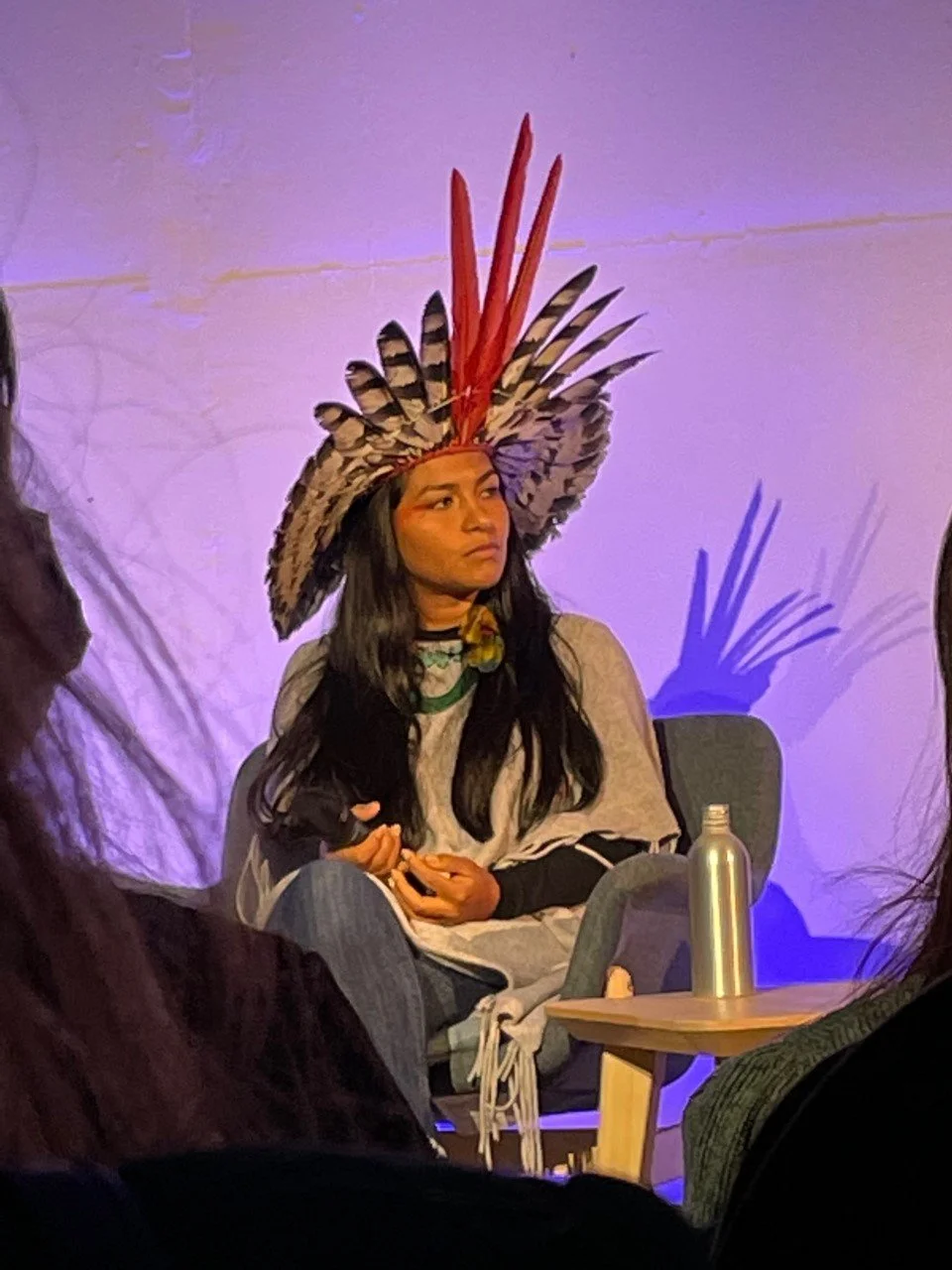COP26 Midway Reflection
Hello from COP26 in Glasgow, Scotland. We are now a three person team from Duke Divinity School who will be sharing from the frontlines of COP26. We didn’t know Nate Rauh-Bieri (M.Div., 2012) was a participant in the Christian Climate Observers Program (CCOP), but when we found that out over the weekend we immediately recruited him to join us. In fact, when we learned about his path from DDS to COP26 we asked him to briefly write about it. We think you’ll find his story below enlightening. Norman also shares a reflection about how he is learning to listen at COP26.
Our plan is to share a midway reflection today and a final reflection at the end of COP26. These will be brief, but hopefully these will give you a glimpse and understanding of what is happening at COP26 from our perspective.
We will also provide select links (see below) for a deeper look into items we think may be of interest. We’re not attempting to provide a comprehensive analysis of COP26. You can get that from your preferred information outlets. Our goals are much more modest, as we hope to provide a behind the scenes look at COP26 by three Christians working on the climate crisis in our respective domains and in our spheres of influence.
Sincerely,
Norman, Nate, and Chris
Chris Elisara
Norman Wirzba, Gilbert T. Rowe Distinguished Professor of Theology at Duke University, and Senior Fellow at Duke's Kenan Institute for Ethics
Nate Rauh-Bieri, Duke Divinity Alumni, M.Div., 2012
Reflection from Norman
Learning to listen at COP26
Among the many conversations that I have had at COP26, the phrase of a Guatemalan farmer will stick in my mind for a long time: “Learn to listen with your whole heart.” There is plenty of evidence to suggest that listening is exactly what is not happening in Glasgow, in America, and around the world.
Numerous people have already noted that there is a deep disconnect between the concerns of indigenous peoples, women, young people, and the objectives of government and business leaders who are drawing up the policy recommendations that will be this COP’s legacy. Whereas the latter frame their conversations with numbers like 1.5 degrees and so many millions or billions of dollars in aid, the former frame their concerns in deeply personal ways. They know that the fate of their families is hanging in the balance, not in some hypothetical future, but right now. Villages are being washed away by floods and tsunamis. The forests they depend upon are being burned to the ground. Farm fields are stricken with drought. Access to fresh water, and thus the journey to get it, recedes ever further into the horizon. Community members protesting “development” projects are being harassed and killed. Who is listening to these people with their whole heart?
I am being convicted of many things while I am in Scotland, not least of which is my own failure to listen to the millions of people who are suffering daily because of the effects of climate change. What I am seeing is that Christians have a responsibility to listen with their whole hearts and bear witness to their pain and suffering, but also their aspirations and dreams. This, in part, is what loving our neighbors requires. What is also clear is that we cannot love our neighbors if we do not also love the neighborhoods that sustain their living.
This same Guatemalan farmer finished his remarks by saying that his people don’t want our pity. Instead, they want us to admit how much we have stolen, and then do the work of reparation that will restore them to their lands and communities. What they want is to be treated with respect, and given the right to determine their own ways of living. They need our help.
Reflection from Nate
Serving a groaning creation
When I attended Duke Divinity School (class of 2012), climate concerns were not on my mind. To be sure, I was glad there were smart people working on “environmental issues,” but I didn’t understand climate science; I had no idea climate change would affect me personally. At Duke, I was focused on questions about global development and how the church could serve in anti-poverty and peacebuilding efforts around the world. Climate change, with its sciency and far-off sound about it, did not seem to be closely related. Good for environmental theologies, in my mind, but I wanted to focus on theological ethics that had to do with actual people.
This disconnect is embarrassing to admit now. How shortsighted! And what a Western (and privileged) way to understand the world. Since then, I’ve come to understand the depth of the predicament we’re in: that climate breakdown affects all of us, is built on ongoing injustices, and is already destroying people’s lives and livelihoods. The climate crisis is a justice crisis, an ethical crisis, and a spiritual crisis. And yet with it are opportunities to reshape the world in the direction of love and care.
Fortunately, my education at Duke provided resources for later understanding and responding to the crisis. At Duke, I learned to think about Christian faith through an interdisciplinary lens. From studying with Willie Jennings, I learned about the making of the racial world—with its separation of people from people, and people from the land—was the making of the same world that caused the climate crisis. And because of my training, I see how the church has ethical and spiritual convictions and practices to offer to the world in the face of the decades of hard work and possibility ahead.
It’s been highly rewarding to reconnect with Duke Divinity at COP26 through Chris Elisara and Norman Wirzba, whose Facing the Anthroposcene lectures earlier this year were excellent and whose classes I wish I would have taken while I was at Duke!
I am thankful for my education at Duke Divinity and look forward to how as a theological school it can serve a groaning creation and the people God loves.
Resources from Chris
Curated resources to engage with the climate crisis
Joint Statement on the Environment: Ahead of COP26, Pope Francis, Bartholomew I, ecumenical patriarch of the Eastern Orthodox Church, and the Anglican archbishop of Canterbury Justin Welby issued an unprecedented ecumenical plea for more ambitious climate action. In their forceful and stirring statement, endorsed by church leaders across Christianity, the church heads make Christian accounts of justice and commands to care for the poor central to their appeal.
“The Climate Crisis Is a Call to Action. These 5 Steps Helped Me Figure Out How to Be of Use.” With a massive climate conference happening on the other side of the world (and with climate change in general), it can be easy to feel like a bystander in the effort. But the reality is, climate action is not a spectator sport—the world needs billions of people making changes in their local contexts, and clergy are positioned to play an important role. To get into the game, see this article by Dr. Katharine K. Wilkinson, co-editor of the highly recommended anthology of essays by diverse women climate leaders (including a number of Christians) called All We Can Save: Truth, Courage, and Solutions for the Climate Crisis.
From Rolling Stone Magazine: Could Prayer Make People Take Climate Change Seriously? “We have to take action if we’re going to feel hopeful.” As COP26 continues, evangelical Christians across the globe are holding a candlelight vigil in hope of swaying humanity to save itself. The Climate Vigil Campaign is an initiative that I’ve worked on for a year with partners, and we kicked it off this Saturday at COP26. The service was pre-recorded and can be watched at this link.
COP26: Fossil fuel industry has largest delegation at climate summit
As a New Zealander, I (Chris) participate in the daily briefings offered by the NZ delegation. The topic of this article was mentioned today in the briefing, namely that NZ, and all the other Pacific delegations at COP--which are small nations severely affected by climate change--are the smallest in years. Thus, they are severely stretched, and although it was diplomatically put, they are struggling to get Pacific voices into the dialogue. In fact, they were rebuffed recently on their attempts to push for de-subsidizing the fossil fuel industry. The struggle is real.
Many, if not all the sessions at COP26, are being livestreamed. You can get a list of events at this link. As an example, if you are interested in urban design and city solutions to climate change, which is an area in plain sight we often don’t see that needs our attention to address the climate crisis, I (Chris) am a panelist at a side event entitled Transforming Action to Practice - Sustainable built environment and Climate solutions, at 11:00 AM -1:00 PM EST. This is a session hosted by the International Union of Architects (UIA) and UN-Habitat’s World Urban Campaign. Here is the link to register and join virtually; or you you can watch the livestream on the UIA’s Facebook page.
CCOP is sending out a daily newsletter from COP26. You can subscribe here.
“COP26 Is a Critical Moment for Christians to Address Extreme Weather Events” from Christianity Today







